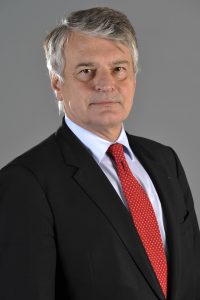Jean-Marie Dauger has served several positions within Gaz de France, including Chief Operating Officer and since the merger of Gaz de France and Suez - with GDF SUEZ then ENGIE - as Former Senior Executive Vice President in charge of the Global Gas & LNG Business Line, one of the five business lines of the ENGIE Group. Mr Dauger is a Chevalier of the National Order of Merit and a Chevalier of the Legion of Honour. Jean-Marie Dauger is also Chair of the World Energy Council’s Studies Committee.
As the Co-Chair of the World Energy Council, what are your priorities and vision over the next three years?
The World Energy Council is unique by the diversity of its members and partners offering an unprecedented access to information and insights on what is or will be happening within the energy sector, which plays such a critical role for the future.
The World has now entered into a so called transition in the face of powerful trends among which are climate, economic and geopolitical challenges and new disruptive developments in technology. As a result, companies, governments, consumers and other stakeholders are reviewing and questioning the former fundamentals of the energy sector. This opens the way for opportunities and challenges of which the details and time frame still are to a large degree undefined.
At a time where uncertainties have dramatically increased, I see the World Energy Council as an ideal instrument to assist its stakeholders to better understand their global environment and future risks but also to identify opportunities by opening a large platform for dialogue, exchange of information and experience. This dialogue may also extend to international institutions or national energy policy makers as well as other stakeholders such as financial institutions or technology providers in view of favouring a smoother, safer and more efficient transition.
What does your role as Chair of the Studies Committee entail?
The Chair of the Studies Committee is a facilitator. The role of the Studies Committee, which is accountable to the Officers’ Council, is to ensure that studies and publications fits with the expectations and strategy of the World Energy Council. This Committee's role is to make sure that members, partners as well as all the Council’s teams involved are in a proper position to carry out their tasks to the best of their ability and have access to proper tools and expertise, in particular from the Council’s members, to deliver the highest quality of work but also to enhance the visibility and the reputation of our organisation.
We benefit from a very high level of expertise in our London office as well as from our partners and members. Our role is to facilitate their work by ensuring a continuous dialogue with them as well as guide their programme towards the Council’s members needs and interests.
Do you think more can be done to mobilise younger energy professionals to be more active participants in the Council’s various study groups and the Council as a whole?
The Council celebrates its diversity of people. It is our mission to help young professionals to contribute and have a better understanding of the energy sector. The Council is a valuable platform through our Future Energy Leaders’ programme to enable young professionals prepare for a future where the energy sector will be increasingly interconnected. There are so many changes facing the sector such as digitisation and innovation in general. More diverse, outward and different approaches need to be stimulated. Our programme can also contribute to this.
Do you think more can be done to encourage participants from less well established member committees get involved?
The Council services all its members equally. Our members have a lot in common but they are, at the same time, in very different positions and face diverse challenges given the specifics of each region and level of economic development. It is the Council’s duty to adapt and focus on challenges that will arise and take into account these differences by creating regional visions, and continuing to hold regional meetings and training workshops as well as helping new member committees settle in.
In your opinion… what do you see as the three most critical areas of concern currently facing the energy sector?
The primary mission of the energy sector is still to ensure a continuous, efficient, sustainable and secure access to energy for all. We all know that this is still far from being the case in many places and this remains one of the main priorities.
Many of the challenges we face will require a high level of international cooperation and alignment, be it for mobilising proper technology, making energy access affordable, fighting against the impact of energy usage of global or local climate, raising proper financing mechanisms or coping with exposure to new and major risks. All this requires an adequate level of dialogue, governance and confidence which still needs to be developed and favoured.
Energy requires a long term view. Protecting the ability to reflect, invest and act with a long-term term view is essential given the magnitude of the needs for new production, distribution and investment needed to meet future demand for energy. At a time where technology is offering new options for producing, transporting or using energy it will become critical to better integrate the visions of all stakeholders. In a more decentralised organisation, a global approach remains of the essence.






_-80_result_688_387_s_c1_c_c.jpg)


